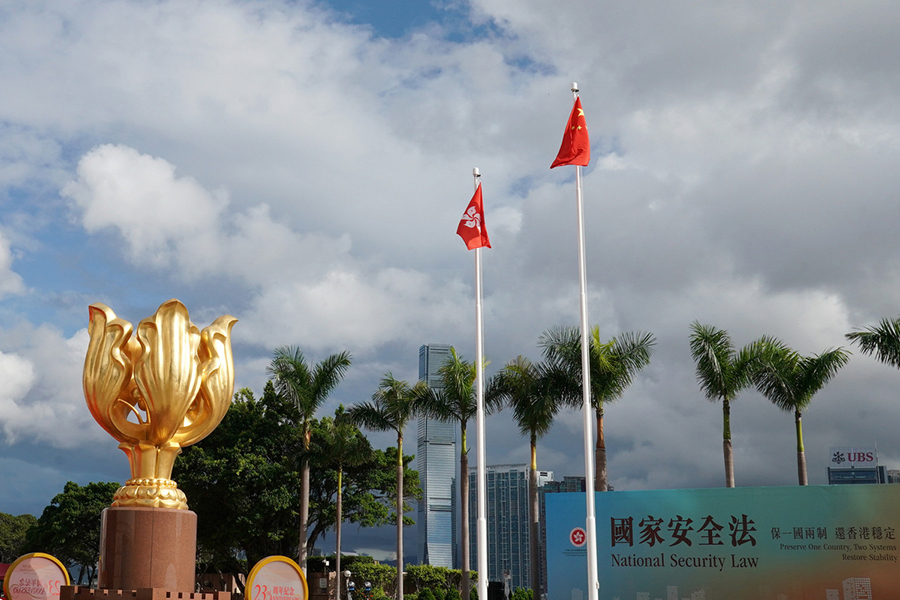Improving electoral system of HKSAR ensures steady development of 'one country, two systems': HKSAR gov't officials


HONG KONG -- Officials of the Hong Kong Special Administrative Region (HKSAR) government have said the National People's Congress (NPC) improving the electoral system of the HKSAR at the constitutional level will ensure the steady development of "one country, two systems" and long-term prosperity and stability in Hong Kong.
A draft decision on improving the electoral system of the HKSAR was submitted last Friday to the fourth session of the 13th NPC for deliberation.
Officials of the HKSAR government said the improvement of the electoral system in the HKSAR fully reflects the central authorities' determination to safeguard national security, its unswerving adherence to the principle of "one country, two systems," and its care for the overall interests of Hong Kong and Hong Kong residents' well-being.
Matthew Cheung, chief secretary for administration of the HKSAR government, said it is a matter of course for "patriots administering Hong Kong" and there is an urgent need to improve the electoral system.
Cheung said opposition lawmakers in Hong Kong's Legislative Council (LegCo) used to filibuster and cause the house committee of the LegCo unable to function properly for months.
In order to hinder the administration of the HKSAR government and achieve their political goals, the opposition lawmakers did all they could, even at the cost of the well-being of Hong Kong residents. These disputes and internal conflicts will not arise if the principle of "patriots administering Hong Kong" is fully implemented, Cheung said, adding that the LegCo can focus on improving people's livelihood and promoting economic development, which allows Hong Kong to move forward and ensures the steady development of "one country, two systems."
Paul Chan, financial secretary of the HKSAR government, said Hong Kong is a part of the country. If "one country" is endangered, the operation of "two systems," the development of Hong Kong and even its status as an international financial center will be out of the question.
Plugging the loopholes in the electoral system at the legal and systematic levels not only solves the problem that Hong Kong cannot handle by itself, but also addresses the shortcomings of Hong Kong in safeguarding national security, Chan said, adding that only in this way can Hong Kong focus on its development and sort out deep-seated economic and livelihood issues.
Teresa Cheng, secretary for justice of the HKSAR government, said governance power should be in the hands of patriots anywhere in the world. Patriot administration is therefore a basic requirement.
Cheng said when formulating the concept of "one country, two systems," the late Chinese leader Deng Xiaoping had stated that patriots must be the mainstay of the idea of "Hong Kong people administering Hong Kong." Therefore, the criterion of "patriots administering Hong Kong" has already been included in the "one country, two systems" principle.
Cheng said according to the Constitution and the Basic Law of the HKSAR, the power of the HKSAR comes from the central authorities and the HKSAR enjoys a high degree of autonomy. However, some matters including national security and constitutional order in relation to the HKSAR are still within the purview of the central authorities. As the highest organ of state power in China, the NPC has the power to introduce laws and other legal instruments including making decisions under the Constitution.
Patrick Nip, secretary for the civil service of the HKSAR government, also expressed support for improving the electoral system of the HKSAR. He said that "patriots administering Hong Kong" is not a new thing and fully meets the constitutional requirements of the HKSAR.
To ensure the steady development of "one country, two systems," Hong Kong must always adhere to the principle of "patriots administering Hong Kong," which is the fundamental principle that concerns the country's sovereignty, security, and development interests, and Hong Kong's long-term prosperity and stability, Nip said.
John Lee Ka-chiu, secretary for security of the HKSAR government, said improving the electoral system is an important measure to ensure the well-being of the more than 7 million people in Hong Kong.
Lee said after the implementation of the Law of the People's Republic of China on Safeguarding National Security in the HKSAR, Hong Kong gradually regained stability. Loopholes and defects in the electoral system, however, still exist, posing risks to the social stability in Hong Kong as well as national security.
This should be thoroughly resolved to ensure the steady development of "one country, two systems" and the lasting security and stability of Hong Kong, Lee said.
Since March 5, many organizations and political figures in Hong Kong have set up street counters to collect signatures, supporting the improvement of the HKSAR's electoral system and the implementation of the principle of "patriots administering Hong Kong."
Secretary for home affairs of the HKSAR government Caspar Tsui Ying-wai and secretary for innovation and technology of the HKSAR government Alfred Sit Wing-hang also signed up for support.
- China's CR450: A new era of high-speed rail at 400 km/h
- TAN SUO SAN HAO to pioneer future of deep-sea exploration
- Xi's discourses on Chinese modernization published in Japanese
- Officials summoned over alleged garbage bin food served to students
- Caring hearts help to enhance quality special education
- Xi sends condolences to South Korean acting president over plane crash




































